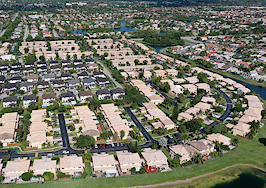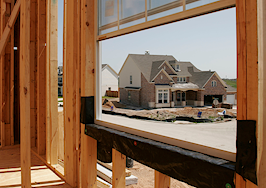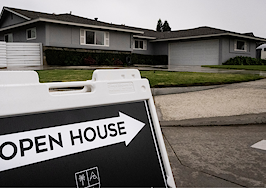New markets require new approaches and tactics. Experts and industry leaders take the stage at Inman Connect New York in January to help navigate the market shift — and prepare for the next one. Meet the moment and join us. Register here.
Look for homebuyer affordability to improve by 9 percent by the end of next year if mortgage rates continue to fall and home prices plateau as expected, according to an analysis released Monday by First American Financial Corp.
The First American Real House Price Index (RHPI) calculates buying power by measuring home prices adjusted for changes in mortgage rates and household income. So while home prices were up 12 percent in October from a year ago, the RHPI jumped by 68 percent as mortgage rates hit a 2022 high.
At $325,000 in October, the average American’s house-buying power was down $162,000 from a year ago, despite 3.4 percent growth in household income to $73,951, the RHPI showed.
But First American Chief Economist Mark Fleming projects a “modest boost” in house-buying power next year, based on an average of different industry forecasts that suggest mortgage rates will retreat to 6 percent by the end of the year, and that national home prices will post a 0.3 percent annual decline during the fourth quarter.

Mark Fleming
“If mortgage rates fall to 6 percent by the end of 2023 as the industry average predicts, household incomes remain flat on an annual basis due to a narrowing labor supply-demand gap and slowing labor market, and nominal house prices decline by 0.3 percent annually as the industry forecasts, then affordability as measured by the RHPI will improve by 9 percent by the end of next year compared with October 2022,” Fleming said in a blog post.
“A more affordable housing market will be welcome news for buyers currently sitting on the sidelines,” Fleming said. “Given the large loss of affordability buyers experienced this year, a possible improvement next year will be a welcome relief for potential buyers.”
After adjusting for mortgage rates and household income, home prices are 5.5 percent higher than their 2006 housing boom peak, the RHPI showed. Looking back to the turn of the century, adjusted home prices are up 49.5 percent from January 2000, even though median household income has increased by 78 percent over the same period.
Mortgage rates expected to fall

Source: Fannie Mae December 2022 housing forecast, MBA housing forecast
In their final forecasts of the year, economists at the Mortgage Bankers Association and mortgage giant Fannie Mae projected that while the Federal Reserve is probably not done raising short-term interest rates, mortgage rates have already peaked.
Fannie Mae economists think rates for 30-year fixed-rate loans peaked at 6.6 percent during the fourth quarter of 2022 and could dip below 6 percent by the first quarter of next year. MBA economists are predicting an even sharper decline, with mortgage rates falling to 5.2 percent by the end of next year and averaging 4.4 percent during the second half of 2024.
On Dec. 14, Fed policymakers made it clear that they’re ready to dial back the pace at which they’ve been raising the short-term federal funds rate.
By telegraphing its intentions to bond market investors, the Fed has already stabilized long-term rates like Treasury yields and mortgages, while also creating room for the abnormally wide “spread” between 10-year Treasurys and mortgages to narrow, which would make home loans more affordable.
Lower rates aren’t expected to prevent another decline in home sales next year, however, with a recession looming and many would-be sellers feeling locked in by even lower rates on their existing mortgages.
Fannie Mae forecasters are predicting the U.S. will enter a recession in the first quarter of 2023 and post negative 0.5 percent GDP growth next year before going into expansion mode again in 2024 with a 2.2 percent annual growth rate. MBA economists are expecting a recession in the first half of 2023, with unemployment jumping from 3.7 percent to 5.5 percent by the end of 2023.
Fleming agrees that the labor market faces growing uncertainty, “as the Federal Reserve continues to tighten monetary policy to curtail demand and slow inflation. Next year, it will be increasingly difficult for the Fed to fight inflation so intensely without broader impacts to employment.”
For now, Fleming said, “the labor market continues to face a labor shortage, which puts upward pressure on wages and, therefore, household income. The labor shortage will likely wane in 2023, meaning the pace of wage growth will likely slow as well.”
According to the First American RHPI, the five states with the greatest year-over-year annual increase in real home prices in October were:
- Florida (86.3 percent)
- Georgia (74.4 percent)
- Alabama (72.6 percent)
- New Hampshire (72.1 percent)
- Alaska (71.9 percent)
The five states markets with the greatest year-over-year annual increase in real home prices in October were:
- Miami (92.8 percent)
- Tampa, Florida (81.4 percent)
- Indianapolis (79.4 percent)
- Jacksonville, Florida (77.1 percent)
- Nashville, Tennessee (75.9 percent)
Get Inman’s Extra Credit Newsletter delivered right to your inbox. A weekly roundup of all the biggest news in the world of mortgages and closings delivered every Wednesday. Click here to subscribe.












